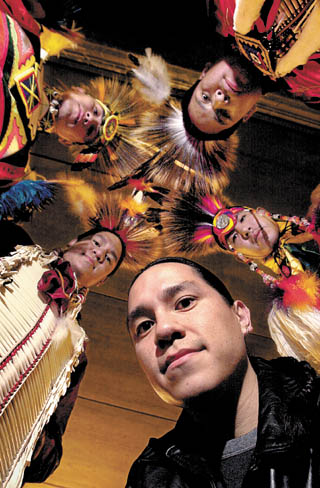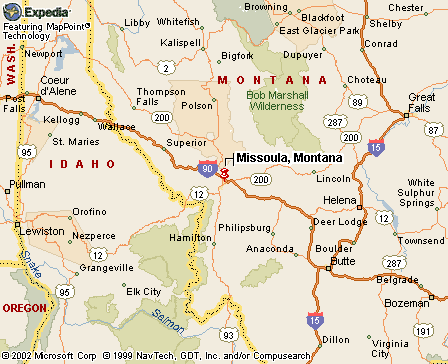|
|
Canku Ota |
|
|
(Many Paths) |
||
|
An Online Newsletter Celebrating Native America |
||
|
June 1, 2002 - Issue 62 |
||
|
|
||
|
Tribe's 1st Pharmacist: Northern Cheyenne Man Takes Walk of Honor |
||
|
by Betsy Cohen Of
The Missoulian
|
||
|
credits: Michael
Gallacher/Missoulian
|
 MISSOULA
- The young man who would soon be honored scanned the powwow crowd
looking for his mother. MISSOULA
- The young man who would soon be honored scanned the powwow crowd
looking for his mother.
Two of Damion Killsback's three brothers were there, along with a sister. His 5-year-old daughter, his nephew, an aunt and an uncle were there, too. But Jackie Tang could not be found in the sea of faces, and if she did not show up soon, Damion's Honor Ceremony would not happen. Finally, she emerged from the young dancers dressed in brilliant tribal finery milling about the passageway to and from the arena floor at the University of Montana's Adams Center. Gifts of honor Damion breathed deeply and shifted his weight from one foot to the other, setting in motion the long reams of fringe on the Northern Cheyenne Grass Dance outfit he wore. Soon, the drumming of the Walking Horse Singers from the Northern Cheyenne reservation in southeastern Montana filled the air with a special song for Damion. Called "Ko'sestse," or "wisest member of the family," the 24-year-old stepped forward with his family to begin his walk of honor. Tribal members quickly joined. Together, they paid tribute to their first pharmacist, three weeks before he would officially receive his doctor of pharmacy degree at UM's 2002 commencement. Standing out In Montana's Cheyenne country, which has 6,500 enrolled tribal members and a 46 percent unemployment rate, few people graduate from college, and many live in poverty. Damion will earn a starting salary of $70,000 with a Billings clinical pharmacy consulting firm. In doing so, he joins the slim fellowship of fewer than 500 American Indian pharmacists in the United States. If he should choose someday to become a professor, he will join the even smaller band of Indian pharmacy professors, who now total five in the country. His accomplishment, Damion said, is the accomplishment of his people; and now he can help heal them. His honor walk, he said, was possible because of his ancestors' journey, and now he is duty-bound to guide his tribe's children to the academic path. "I'm glad we could survive this long as a people and come together to celebrate," Damion said. "My people had to run hundreds of miles from soldiers to get up here to give their people a better life." Damion gives much of the credit for his accomplishment to his mother. Raised on the Northern Cheyenne Reservation, Damion's mother was forced into a Bureau of Indian Affairs boarding school. Despite all the change in her young life, Jackie became a dedicated student, a dorm mother and sister to the younger children. She became steeped in Cheyenne tradition during school vacations, learning at the sides of her grandmother and aunts. Both influences taught her that she would never leave her children's care or education in the hands of someone else. "I watched those young kids who were left at school and decided that when I had children, I was going to be with my kids - no matter what," Jackie said. She married, had six kids, got divorced and took over as the family's sole caregiver in the small wind-swept town of Busby. "I kept a pretty tight hold on them," Jackie said of her kids. "When I divorced their dad, I told them 'If you live with me, you have to help because it's going to be hard, and we all have to help out.' " Knowing that education was the path to a better life, Jackie chose to enroll her children in Colstrip, about 40 miles away, because she believed it offered better teachers and more learning opportunities. It was a long trip. Damion and his twin brother, Dion, and younger brothers Lawrence and Leo, had to rise at 6 a.m. to catch the bus at 7 a.m. to get to school by 8 a.m. Back home, Jackie kept her children motivated by teaching them the hard realities of life on the reservation. "I showed them what alcohol does to them," she said. "I showed them their relatives who are messed up in the head. ... I showed them the real stuff and asked them if they wanted to end up like that." "Mom instilled in us that education was the most important thing, so studying through junior high and high school - we didn't make a big deal about it," said Dion, who is in his second year of law school at UM. When classes like organic chemistry seemed beyond comprehension, and when he felt isolated in Missoula, Damion said he called his mother for advice. She was never upset with his thoughts about quitting, asking only: "What will you do if you are not in school?" "I never had an answer for her," Damion said. "So I stayed." He completed his pre-pharmacy classes and he applied for formal acceptance into the clinical pharmacy program - as all students are required to do. Going in, he knew the journey would be difficult. He knew he was committing to a six-year competitive program. Class hours were long, lab hours were long, and homework assignments were even longer. "I just believed in my abilities," Damion said. "I knew it would be a lot of hard work, and I knew I wasn't the smartest guy in my class. But I knew if I worked hard I would get through it" In the dark hours of uncertainty and mental exhaustion, Damion said, he drew strength from his people. "They told me I could do it," he said. "And my mom taught me how to work hard." UM pharmacy professor Rustem Medora said the program, which ends in a doctor of pharmacy, is a rigorous science curriculum that by nature culls the weakest students. In Medora's 35 years teaching at UM, 23 Indians have graduated from UM's pharmacy program, which has in the last decade evolved into a clinical program and graduates about 50 students each year. About a dozen of the 23 Indian pharmacy graduates, like Damion, are students who participated in a federal grant-funded program called Health Careers Opportunity Program. It identifies talented minority science students in high school and helps prepare them for college-level courses through intensive academic immersion programs on weekends and during the summer. "But Damion stuck with it and did a good job," he said. "I'm sure he had a lot of bumps along the way, but he stayed focused and finished what he set out to do. We are all very proud of him." Damion said he is ready to make his way as a professional on the healing path. "I like being regarded as someone with knowledge, someone that is looked to for medical advice," he said. "Especially back home. How many people my age could sit down and assess if a diabetic's medication isn't working? "It's a huge responsibility." |

|
www.expedia.com |
|
|
||
|
|
||
| Canku Ota is a free Newsletter celebrating Native America, its traditions and accomplishments . We do not provide subscriber or visitor names to anyone. Some articles presented in Canku Ota may contain copyright material. We have received appropriate permissions for republishing any articles. Material appearing here is distributed without profit or monetary gain to those who have expressed an interest. This is in accordance with Title 17 U.S.C. Section 107. | ||
|
Canku Ota is a copyright © 2000, 2001, 2002, 2003 of Vicki Lockard and Paul Barry. |
||
 |
 |
|
|
The "Canku Ota - A Newsletter Celebrating Native America" web site and its design is the |
||
|
Copyright © 1999, 2000, 2001, 2002, 2003 of Paul C. Barry. |
||
|
All Rights Reserved. |
||